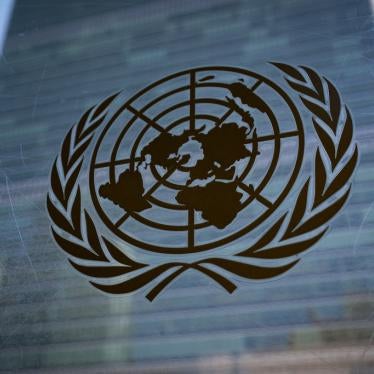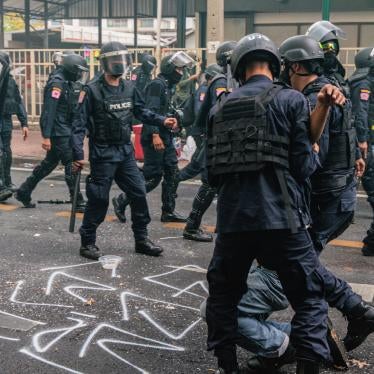The recent appointment of a United Nations Special Representative to the Secretary-General on business and human rights provides an important opportunity to advance the debate on corporate accountability. The Special Representative’s work, if focused appropriately, can help develop a common understanding of the human rights responsibilities of companies. This work also should serve to help build consensus on the need to further strengthen corporate accountability standards and measures for their implementation.
Background
The Commission on Human Rights, at its 61st Session, voted to create a mandate for a Special Representative to the Secretary-General on the issue of human rights and transnational corporations and other business enterprises.1 In July 2005, U.N. Secretary-General Kofi Annan named Harvard University professor John Ruggie to this high-level post, which was created for an initial two-year period. Until stepping down to accept his new appointment, Professor Ruggie served as U.N. Special Advisor to the Secretary-General on the Global Compact, a voluntary effort to promote corporate social responsibility.
The Special Representative on business and human rights is expected to identify standards of corporate responsibility and accountability, enhance understanding and recognition of these standards and the fundamental concepts that underlie them, and issue recommendations on the future direction of the U.N.’s work on business and human rights issues. He is due to hold broad-based consultations and issue two reports, an interim one in 2006 and a final one in 2007.
Recommendations
Human Rights Watch encourages the Special Representative to carry out his mandate in a manner that will help advance discussions of corporate accountability. The recommendations below relate to each of several aspects of his mandate, as well as provisions on consultations and reporting. We emphasize in particular the need to analyze standards for corporate behavior through a human rights lens, to examine business and human rights issues in the context in which they arise (including through case study research), to recognize the gaps in implementation of and compliance with international standards, to consult widely, and to promote the strengthening of standards.
1. Articulate standards of corporate responsibility and accountability, focusing on international human rights and humanitarian law, principles, and best practice
This exercise should not catalog all existing initiatives of possible relevance, such as the proliferation of voluntary corporate social responsibility initiatives that use many different standards and often are disengaged from human rights principles. The Special Representative should instead identify and reaffirm standards for corporate behavior that are rooted in human rights and humanitarian law. In doing so, he should build on existing elaborations of the human rights responsibilities of business that take this approach, including the provisions of the U.N. Norms on business and human rights.2 Moreover, he should analyze these standards with a view to assessing their actual and potential impact on the protection of human rights. As such, it will be important to consider elements such as their reach (e.g., whether reflected in global, national, or industry-specific initiatives) and the level of compliance currently associated with them. To account for the evolving nature of these standards, the Special Representative also should make note of any relevant legal developments or other significant efforts to strengthen the standards or assure their more effective implementation.
2. Examine state efforts to regulate business and provide accountability for human rights abuses
The Special Representative should explore the response of states—individually or through international cooperation—in connection with actual cases of alleged human rights abuses tied to business activity. He should identify cases in which compliance mechanisms have been utilized effectively as well as examples that indicate gaps in the protection of human rights. He also should consider potential measures to fill identified gaps.
3. Research and clarify, including with reference to case studies, the fundamental concepts that underpin discussions of business and human rights
The Special Representative is due to examine concepts such as “complicity” and “sphere of influence.” This research should be informed by academic work on the subject and also close examination of actual cases. In particular, field visits and interviews with relevant parties would provide an important perspective, as they would for all aspects of the Special Representative’s work. It also may be useful to assemble a legal team to assist with research efforts.
4. Analyze best practices of states and companies, including implementation and compliance mechanisms
This work should entail a critical analysis of commitments undertaken and how they have been carried forward in practice. Particular attention should be drawn to provisions for independent monitoring and public reporting. Analysis of best practices also would help respond to a request by the Commission for tools to perform human rights impact assessments of company activities.
5. Reach out to and thoroughly engage with all stakeholders, making special efforts to consult with affected communities
The consultations process should be at the center of the Special Representative’s work. Stakeholders include representatives from governments, international and regional organizations, business, and civil society, including membership associations, nongovernmental organizations, and indigenous and other communities affected by business operations. Consultations with affected communities could be effected through visits to those communities, and such travel could be combined with case study research.
6. Recommend measures towards greater recognition of and compliance with relevant human rights standards by business
The Commission has previously indicated its intention to “identify options for strengthening standards [on business and human rights] and possible means of implementation.”3 To this end, the Special Representative’s work should achieve wide recognition of relevant standards and advance ideas for improving corporate accountability. He should consider developments with regard to analogous issues, such as the fight against corruption, where measures such as the 1997 anti-bribery convention of the Organisation for Economic Co-operation and Development suggest possible models.4
1 Resolution 2005/69 of April 20, 2005, approved by the Economic and Social Council on July 24, 2005.
2 The U.N. Norms on the Responsibilities of Transnational Corporations and Other Business Enterprises with Regard to Human Rights were adopted by the U.N. Sub-Commission for the Promotion and Protection of Human Rights in 2003. See also “Report of the United Nations High Commissioner on Human Rights on the responsibilities of transnational corporations and related business enterprises with regard to human rights,” February 15, 2005, U.N. document number E/CN.4/2005/91.
3 Decision 2004/116.
4 The 1997 OECD Convention Against Bribery of Foreign Public Officials in International Business Transactions went into effect on February 15, 1999. The convention’s text and subsequent reports on implementation are available from http://www.oecd.org.
LAST UPDATED SEPTEMBER 9, 2005







